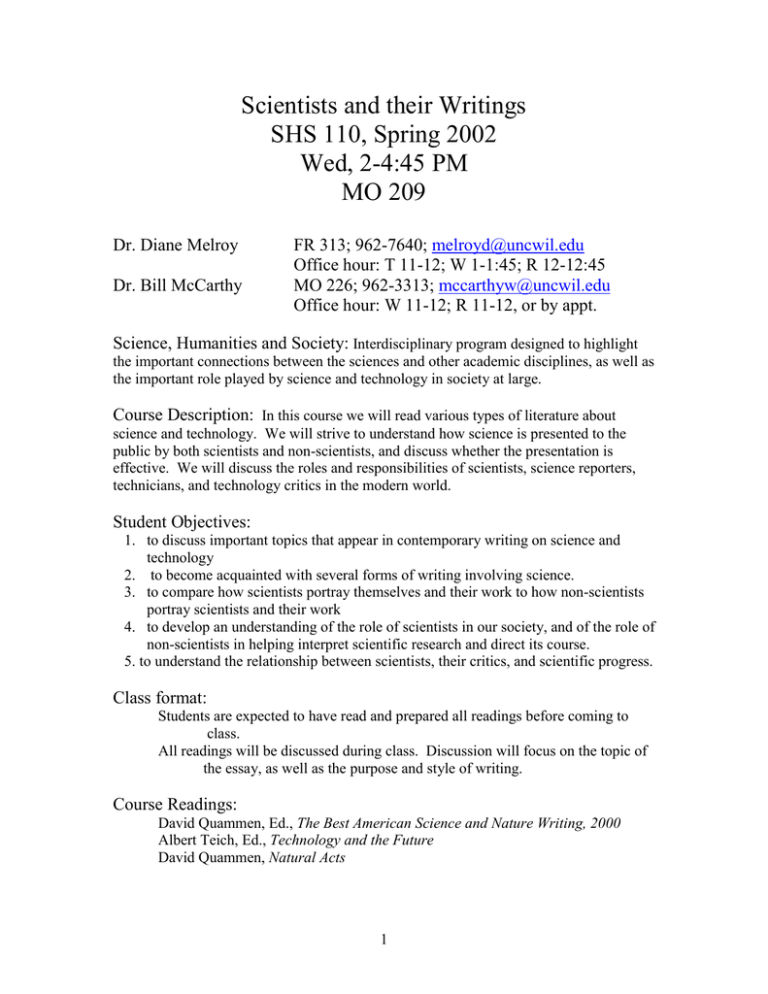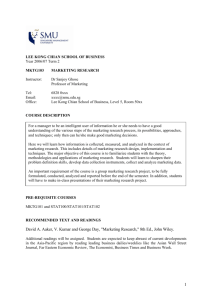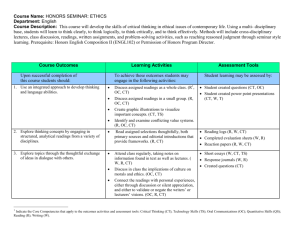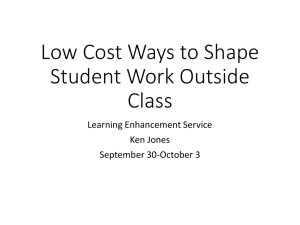Scientists and their Writings SHS 110, Spring 2002 Wed, 2-4:45 PM MO 209
advertisement

Scientists and their Writings SHS 110, Spring 2002 Wed, 2-4:45 PM MO 209 Dr. Diane Melroy Dr. Bill McCarthy FR 313; 962-7640; melroyd@uncwil.edu Office hour: T 11-12; W 1-1:45; R 12-12:45 MO 226; 962-3313; mccarthyw@uncwil.edu Office hour: W 11-12; R 11-12, or by appt. Science, Humanities and Society: Interdisciplinary program designed to highlight the important connections between the sciences and other academic disciplines, as well as the important role played by science and technology in society at large. Course Description: In this course we will read various types of literature about science and technology. We will strive to understand how science is presented to the public by both scientists and non-scientists, and discuss whether the presentation is effective. We will discuss the roles and responsibilities of scientists, science reporters, technicians, and technology critics in the modern world. Student Objectives: 1. to discuss important topics that appear in contemporary writing on science and technology 2. to become acquainted with several forms of writing involving science. 3. to compare how scientists portray themselves and their work to how non-scientists portray scientists and their work 4. to develop an understanding of the role of scientists in our society, and of the role of non-scientists in helping interpret scientific research and direct its course. 5. to understand the relationship between scientists, their critics, and scientific progress. Class format: Students are expected to have read and prepared all readings before coming to class. All readings will be discussed during class. Discussion will focus on the topic of the essay, as well as the purpose and style of writing. Course Readings: David Quammen, Ed., The Best American Science and Nature Writing, 2000 Albert Teich, Ed., Technology and the Future David Quammen, Natural Acts 1 Grading: Intake points 5 per class Participation 5 per class Presentation on a scientist/author 2 written reaction papers 2 peer reviews of reaction papers 2 midterms and a final 75 points 75 points 50 points 50 pts each 25 pts each 50 pts each 75 75 50 100 50 150 Intake points will consist of quizzes, group quizzes, or other assignments. Participation evaluation described on handout, and on course web page. Presentation will focus on a scientist or science writer of your choice. Presentations will be 10-15 minutes in length and should include biographical material as well as a discussion of the person’s work. Since we don’t want any duplications of presentations, please let one of the instructors know when you have decided on your topic. Reaction papers will be your written response to 2 essays of your choice. Guidelines will be distributed and will be available on course web page. Peer reviews of reaction papers. We will have class discussion on the process and expectations for peer writing review. Examinations. Questions will ask you to comment on topics covered by several essays. Questions will be distributed in advance. Topical Calendar: The Wonder of Science Jan 09 Course introduction Jan 16 Readings: Quammen Ed: Sacks, Angier, Lamberton, Murphy Jan 23 Readings: Quammen Ed: Sides, Taubes, Hayes Teich: Florman Medicine and Health Jan 30 Readings: Quammen Ed: Hooper, Preston Discussion on what makes a good paper and how paper will be graded. Discussion of the role of the peer reviewer and how peer reviewing will be graded. Feb 06 Readings: Teich: R. Weinberg, Morone/Woodhouse First draft of first paper due, in triplicate. One for each of us, one for peer reviewer. Papers given to peer reviewers to be returned in 2 weeks. Feb 13 Readings: Quammen Ed., Epstein, Gawande Second half of period: midterm test 1 2 David Quammen Feb 20 Readings: Quammen Acts: Section 1 (All God’s Vermin) First papers returned to writers from peer reviewers. Self and group assessment. Feb 27 Readings: Quammen Acts: Section 2 (Prophets and Pariahs) Final copy of first paper due, in duplicate. Mar 06 Spring Break Mar 13 Readings: Quammen Acts: Section 3 (Eloquent Practices, Natural Acts) 4 presentations Mar 20 TBA 4 presentations Technology Assessment Mar 27 First half of period: midterm test 2 Readings: Teich: Marx, A. Weinberg Apr 03 Readings: Teich: Mesthene, McDermott 4 presentations Apr 10 Readings: Teich: Brody, Goodman Quammen Ed: de Palma First draft of second paper due, in triplicate. One copy given to peer reviewers. 4 presentations The Environment Apr 17 Readings: Quammen Ed: Conniff, Matthiessen Second paper returned to authors from peer reviewers 4 presentations Apr 24 Readings: Quammen Ed: Stanford, Hoagland Final copy of second paper due, in duplicate 4 presentations May 1 Readings: Quammen Ed: Berry Teich: Schumacher 4 presentations. 3 First class period: Introduce ourselves, the course and syllabus, the SHS program, the idea of interdisciplinary studies. Have students introduce themselves, including name, why they took this course, what particular interests they have, etc. Have each student make a name tag for him or herself. 15 minutes (2-2:15) Hand out a short article for them to read. I bet we could find an essay by Quammen that would work nicely here. 15 minutes (2:15-2:30) Divide the class into 6 randomly chosen groups. Divide up by birth month, for example, and merge any too small or break up any too large. The groups’ task is to come up with questions that we will use to discuss our readings each week. The questions need to be general, applicable to many types of articles. Each group would be asked to come up with at least 4 discussion questions. The goal of the discussion based on these questions is that it will result in a good understanding of the article by all members of the class. 20 minutes. (2:30-2:50) Each group will then read its questions to the class with a brief explanation of why they thought that was a good question. Each person will read and describe at least one question. The groups will then hand in a copy of their questions to us. 10 minutes (2:50-3) Break 3-3:15 During the break, we will look over these questions and write them on an overhead sheet. After the break we will discuss the questions as a whole class. One question at a time, asking whether it is a good question or a poor question to facilitate class discussion and individual understanding. We can ask, for example: is the question easy to answer or does it require thought or analysis, does it lend itself to discussion by allowing more than one point of view, does it deepen understanding of the article, etc. End up by deciding on a core set of questions to be used. 25 minutes (3:15-3:40) After the discussion: critique the discussion. Point out what we feel were the highlights and low points. Ask the class to respond to our feelings. Ask for suggestions as to how to improve discussion. 5 minutes (3:40-3:45) Rebreak into different randomly selected groups. Use the last digit of the social security number. Now use the questions that we have generated to analyze the article in the small groups. Each group will answer all of the questions and also respond to how they feel about that question. One group member will be the recorder for the group and another will be the reporter. 25 minutes. (3:45-4:10) The reporter for each group will choose one question and will share the group’s answer with the class. The feelings of the group about the question will also be shared. A summary of the group’s answers and feelings will be turned in. 15 minutes. (4:10-4:25) We will have a brief whole-class discussion concerning the syllabus and this first class meeting. People can share what they liked, did not like about it, comments on the syllabus, suggestions for next time, etc. 15minutes. (4:25-4:40) 4 Finally, each person will, working alone, come up with the names of one or several people that he or she would like to be in a semi-permanent group with. We will form these groups, which will meet together for the first half of the semester, and announce them next time. 5 minutes (4:40-4:45) Self and group assessment: Write up what grade you feel you deserve to get for the course so far, and why. If you give yourself an A, be very specific about why you feel you should get an A, which after all means excellent work. If you give yourself a B, which means above average work, explain in what ways you are above average. If you give yourself a C, tell us why you believe that your work is average. If you are not performing as well as you would like, explain what you will do to improve your grade for the next half of the class. Also grade your group members on their preparation and contribution to group activities. For the second half of the class, we will form new small groups. Please make a list of any class members (that are not in your current group) that you would NOT like to have in your new group. I’m concerned about the class getting too predictable, if we use the same questions too often. However we don’t want it to be scarily unpredictable. Let’s think about this problem… Ideas for intake points at the beginning of each class period Quizzes over readings Group quizzes -- harder than individual quizzes Some sort of homework assignment concerning readings --Have each student bring in a discussion question for each reading --Have each student write a position paragraph to be read aloud and discussed by the class. It may help to have students trade paragraphs and read one which is not theirs, at least as first --Have students write a dialog between an author and one of the people (or animals?) featured in an article Midterm and final would consist of answering questions for a reading that we have not discussed. Assign readings as usual, discuss some during the first half of class, then give another as the test. 5





